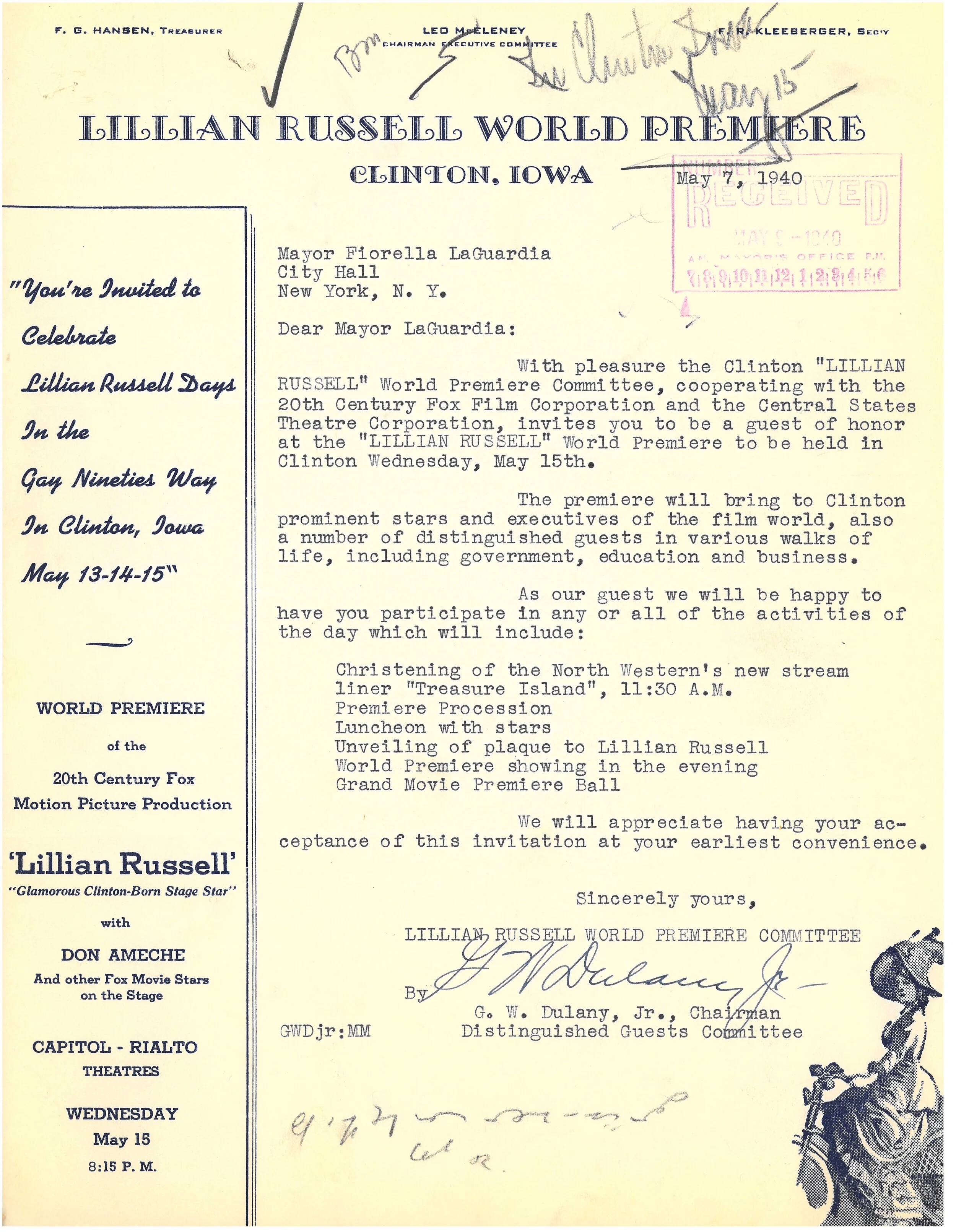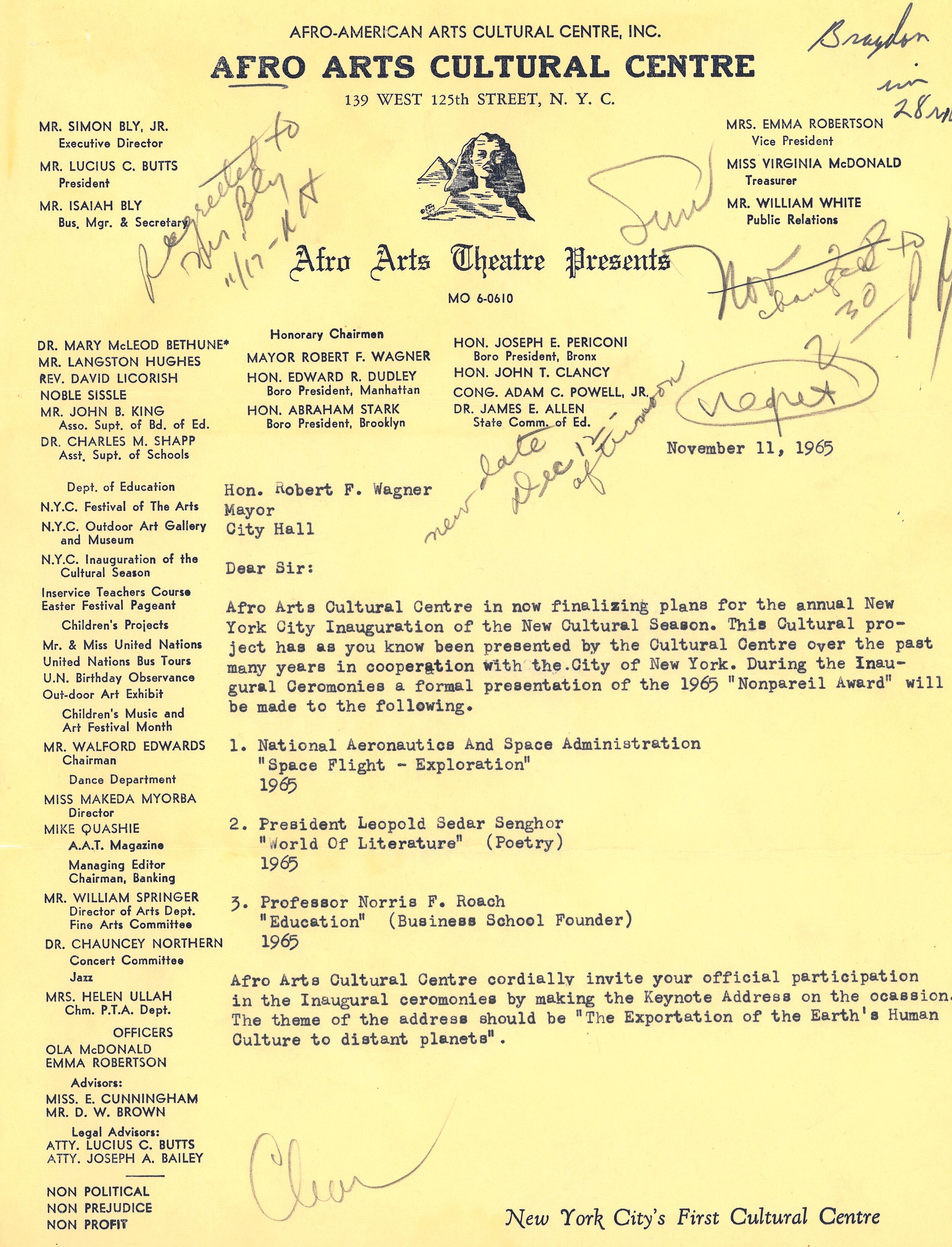When the Municipal Archives closed in March 2020, due to COVID, and all staff began to work remotely from home, several archivists were assigned to ‘transcription projects.’ This work involved transcribing data from analog descriptive materials, such as hand-written inventories, into searchable databases.
Invitation to Mayor Fiorello LaGuardia from the Jackson & Perkins Company to the Reception and Preview of the Parade of Modern Roses, June 11, 1940. Mayor Fiorello LaGuardia Collection. NYC Municipal Archives.
Blogs this past year have highlighted several of the transcription projects including the Brooklyn Condemnation Photographs, Brooklyn Grade Crossing Photographs, and the Early Mayors Papers.
Invitation to Mayor Fiorello LaGuardia from the New York Newspaper Women’s Club to attend their annual party, March 14, 1935. Mayor Fiorello LaGuardia Collection. NYC Municipal Archives.
As noted in previous blogs about the Early Mayors Papers, archivists transcribing information were struck by the huge volume of letters sent to the mayor. The correspondents made suggestions, filed complaints, requested help finding family members, and very frequently, asked for jobs.
Invitation to Mayor William H. Wickham from the Memorial Committee of the Grand Army of the Republic to take part in their ninth annual parade, May 22 1876. Early Mayors Papers - Mayor William H. Wickham Collection. NYC Municipal Archives.
And they also sent invitations. Not surprisingly the mayor was invited to all types of events—grand openings and tours, commemorations, reunions, holiday parties, premieres, fund-raisers, award ceremonies, etc.—sponsored by every type of organization—charitable, entertainment, military, political, religious, academic, neighborhood, athletic, etc. Often, the mayor was invited to speak at the event, on the assumption that as a politician he would welcome any opportunity to connect with constituents (and preferably voters).
Invitation to Mayor Hugh J. Grant to visit a horse farm in New Jersey, January 8, 1891. Early Mayors Papers - Mayor Hugh J. Grant Collection. NYC Municipal Archives.
Somewhat less expected are the invitations to more intimate gatherings. It is not always clear whether the invited mayor was already acquainted with the person or family, but there seems to have been an assumption that of course the Mayor of the City of New York would want to stand as Godfather to a newborn child.
It also became apparent that this was not just a 19th century phenomenon. Invitations can be found throughout the mayoral collections in the Municipal Archives, although their location within the collections is not consistent.
Invitation to Mayor William Gaynor from the Widowed Mothers’ Fund Association to make a brief address at their first annual meeting, December 31, 1909. William Gaynor Collection. NYC Municipal Archives.
In the Early Mayors Papers, invitations are filed in the “letters” folders. With only one exception, in the later mayoral collections dating from 1898 to 1934, invitations can be found in the general correspondence series. The exception is Mayor William Gaynor. His subject files included one folder labeled invitations.
Invitation to Mayor Fiorello LaGuardia to attend the world premiere of the movie “Lillian Russell,” on May 7, 1940, in Clinton, Iowa. Mayor Fiorello LaGuardia Collection. NYC Municipal Archives.
Mayor Fiorello LaGuardia resumed that approach with the start of his administration, on January 1, 1934. The assistants handling correspondence maintained the many, many invitations received by the Mayor as a separate series. They total 70 cubic feet and are arranged by the name of the requesting person or organization. Assistants to Mayor O’Dwyer continued this practice. Invitations to Mayor Impellitteri and Mayor Wagner were separately identified in the subject files. During the administrations of Mayor Lindsay and Mayor Beame, invitations again were filed within the ‘General Correspondence’ series.
Beginning with Mayor Koch, invitations were generally handled by a scheduling office and maintained as a separate series within the records of that office. Invitations sent to Mayor Dinkins total 110 cubic feet. Invitations can also be found in the Mayor Koch, Dinkins and Giuliani photograph collections.
Given the quantity of invitations, clearly the mayor only accepted a tiny fraction of the requests. Prior to the LaGuardia years, it is often difficult to determine which invitations were accepted and which were not.
Letter of Regret, May 2, 1940. Mayor Fiorello LaGuardia Collection. NYC Municipal Archives.
In Mayor LaGuardia’s files, an invitation is almost always accompanied by a carbon copy of the reply sent in response. Mayor LaGuardia’s answers are in the form of a short letter, usually written by an assistant, politely thanking the sender and explaining that his busy schedule prevented attendance at the event. Replying to the Lillian Russell World Premiere Committee, in Clinton, Iowa, on May 10, 1940, James Harten, Aide to the Mayor, “. . . regrets engagements here in New York precludes his making a trip to Iowa at that time. He is sorry a more favorable reply cannot be sent, but is confident you will understand the situation.”
Invitation, via telegram, to Mayor William O’Dwyer, to be a dais guest of honor at dinner under auspices of the Roosevelt Four Freedoms Award Committee, May 3, 1949. Mayor William O’Dwyer Collection. NYC Municipal Archives.
Apparently, Mr. Harten kept his job as “Aide to the Mayor” under LaGuardia’s successor, Mayor William O’Dwyer (1946-1950). On May 28, 1946, Harten wrote to Mr. Arthur Smith, Secretary of the Franklin D. Roosevelt Home Club, in Hyde Park, N.Y. saying that Mayor O’Dwyer, “…regrets to find his time schedule on that day leave no opportunity of planning an additional commitment since his entire afternoon is taken up by engagements preciously accepted.” O’Dwyer had been invited to a memorial service for the late President, Franklin D. Roosevelt, on Memorial Day.
Invitation to Mayor William O’Dwyer to view the new Rolls-Royce and Bentley Cars, at the Waldorf Astoria Hotel, November 1947. Mayor William O’Dwyer Collection. NYC Municipal Archives.
Not all mayoral invitations, especially those after the LaGuardia administration, are accompanied by copies of the reply. On many, the answer is hand-written on the invitation itself. Mayor O’Dwyer received an invitation, in the form of a telegram dated May 3, 1949, to be a “guest of honor at dinner under auspices of Roosevelt Four Freedoms Award Committee,” to be held on May 13th at the Waldorf Astoria Hotel. “Regret- Mayor has previous engagement” is scrawled on the invitation, along with a notation that “K of C [Knights of Columbus] Charity Ball Same Night.”
Invitation, to Mayor William O’Dwyer, to attend premiere of movie, “The Roosevelt Story,” July 31, 1947. Mayor William O’Dwyer Collection. NYC Municipal Archives.
The death of President Roosevelt in 1945 led to a striking number of invitations to events dedicated to his memory. In addition to the Roosevelt Home Club, and the Four Freedoms Award Committee, O’Dwyer’s records include invitations from the Franklin D. Roosevelt Memorial Foundation and The Roosevelt House Clubs at Hunter College. It also included an invitation to the world premiere of a movie, “The Roosevelt Story,” billed as “The Most Important Picture of the Century,” at 8;30 p.m. on August 21, 1947. The invitation was careful to note that it followed “. . . a scenario which received Mrs. Eleanor Roosevelt’s approval.” Mayor O’Dwyer RSVP’d yes for this one.
Invitation to Mayor Robert F. Wagner from the Afro Arts Cultural Centre, to make an address at their inaugural ceremonies, November 11, 1965. Mayor Robert F. Wagner Collection. NYC Municipal Archives.
Invitation to Mayor Robert F. Wagner, to the dedication of new Boys’ Club in the Bronx, November 30, 1965. Mayor Robert F. Wagner Collection. NYC Municipal Archives.
The practice of sending a formal letter of reply became less consistent during the Wagner administration (1954-1965). In some instances, a telephone call from an assistant served the purpose. An assistant to Mayor Wagner noted “Regretted… spoke to Miss Smith” in reply to the Madison Square Boys’ Club invitation to the dedication of their new Boys’ Club in the Bronx, on December 13, 1965. Similarly, an aide penciled “Mr. Epstein accepted phone message of regret on November 9, 1965,” on the invitation from The New York Society of Architects for their Annual Dinner Dance on December 14, 1965.
The thousands of invitations add a human element to the oftentimes dry and impersonal documents in the mayoral collections that record the city’s history over more than a century.
In a letter dated October 27, 1891, Mrs. John McCann, “respectfully” wrote Mayor Hugh Grant: “Dear Sir, You are kindly invited to stand as God Father to your intended name sake Hugh J. Grant McCann in Father Taylor’s Church, 71st Street near Boulevard next Sunday the first of November at 4 p.m.” Mayor Grant’s reply











